“We decided to petition for this hearing today because we are an organization that works to get people out who have been in for 30, 40, 50, 60 or more years in prison. Our organization is made up of mostly women who are working to get their folks out of prison. Right now in the United States you have two and three generations of men and women, mothers and fathers from the same family, incarcerated. All of them are attached to generations of women. For us today, this is not simply a hearing, this is a trial. This is something for 400 years we’ve been waiting. What you see here is, we are the daughters of the plantation, daughters of Maroons, daughters of Abolitionists, daughters of Freedom Fighters, daughters of Garveyites, daughters of Revolutionaries, and we are versus the United States, and they have been found guilty. The crime is the war on the Afrikan woman’s womb. Anything that has come out of the Afrikan woman’s womb in the last 400 years has been attacked, assaulted, decimated, incarcerated, imprisoned, and this will no longer be tolerated. This is unacceptable. Walter Rodney, in his book How Europe Underdeveloped Africa, talks about this underdevelopment. Thus, 400 years later, the Afrikan person that comes out of the Afrikan woman’s womb is still being underdeveloped by institutional racism and White Supremacy racism.
“So therefore, today, we sentence the US, and all the Western World that has benefited from our human resources, to 100 years of reparations that is to be paid in full. Reparative justice. In the next 10 to 20 years we want this abolition of prisons to commence. We want the extraction of our human resources from the human resource of the Afrikan woman’s womb to stop feeding the pipeline of institutional racism and generational incarceration. This will no longer be tolerated. We close the chapter today on the Department of Justice, the Prison Industrial Complex, any system entire that oppresses our bodies, our people, the Afrikan woman’s womb.
“Edward Baptist in his book, The Half Has Never Been Told: Slavery and the Making of American Capitalism, emphasizes this, that the extreme amounts of money that has been made from the human resources of Afrikan people, Dr. [Tasseli] McKay [has calculated] the price, so we say the [price] to be paid is 7.16 trillion dollars to the Black woman, only for the last four decades of incarceration, and we’re talking about one institution. Today’s verdict that has been passed is sealed. It cannot be undone. The seven testimonies and interventions that have occurred [here today and documented below are akin to the story of] the Walls of Jericho, and they will fall, tomorrow being the seventh day [November 7]. This verdict is sealed today by our ancestors, Alberta Williams King, Winnie Mandela, Maria Elena Moyano, Safiya Bukhari, Louise Little, La Mulatresse Solitude, and Fannie Lou Hamer. [The walls of Jericho] will fall today. I thank you.”
Thus the objective of this hearing, held at the offices of the Organization of American States (OAS) at 1889 F Street, NW in Downtown Washington, DC on Monday, November 6, was proclaimed by the organizer of this session, Ms. Tomiko Shine, cultural anthropologist, Founder and Director of Aging People in Prison Human Rights Campaign (APP-HRC), an organization dedicated to securing the freedom of those who have been held in penitentiaries and prisons for upwards of 20 to 50 years. Many of these aging people in prison are what we often refer to as Political Prisoners, members of organizations such as the Black Panther Party (BPP), American Indian Movement (AIM), MOVE and other political-dissident groups who were targeted under the United States Federal Bureau of Investigation’s Counter-Intelligence Program (COINTELPRO). Others were convicted in tainted trials on questionable evidence in spite of their lack of political activism, and still others were handed draconian sentences for relatively minor offenses and have been imprisoned for decades. Practically all of the prisoners and former prisoners represented by APP-HRC have grown old under incarceration, and have faced struggles not only in securing their release through parole or exoneration, but also in adjusting to “life on the outside” after being freed. In practically all of these cases, the burden of their imprisonment has been felt most acutely by their families, particularly by Black women.
This hearing was presided over by the OAS’s Inter American Commission on Human Rights (IACHR) for its 188th Session. The Commissioners on the panel were Ms. Margarette May Macaulay (President), Ms. Roberta Clarke (Second Vice President), Ms. Julissa Mantilla Falcón, and Ms. Tania Reneaum Panszi (Executive Secretary).
Ms. Maccaulay, President of the IACHR, opened the session, welcomed the presenters and received their testimonies, after which she and the Commissioners present asked several follow-up questions and offered their words of support and encouragement, and a request to remain connected to the presenters so they can receive further updates and calls to action from them.
Introductory Presentations by the Expert Panel
Attorney Efia Nwangaza, Esq., South Carolina-based human and civil rights attorney, director of the Malcolm X Center for Self Determination, founder and coordinator of WMXP Community Radio, chair of the US Human Rights Network’s Political Prisoners and State Repression Working Group, past co-chair of the National Jericho Movement for the release and freedom of all US-held political prisoners, was the first presenter:
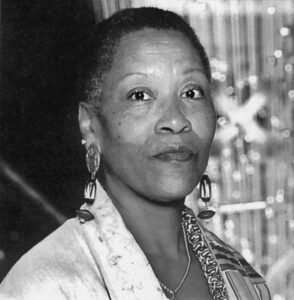
Attorney Efia Nwangaza, Esq.
“The United States is party to several human rights treaties and conventions, and the issue of mass incarceration has raised concerns about violations of these treaties in the context of the disproportionate impact on Black women. Some of the key treaties include the International Covenant on Civil and Political Rights, ratified in 1992, the Convention Against Torture and Other Cruel, Inhuman and Degrading Treatment or Punishment, ratified in 1994, the Convention on the Elimination of All Forms of Racial Discrimination, ratified in 1994, and the Universal Periodic Review along with the Universal Declaration of Human Rights. These treaties encompass fundamental human rights principles, including non-discrimination, the right to a fair trial, the prohibition of torture and cruel treatment, and economic and social rights. The impact of mass incarceration on Black women, including issues such as racial disparities in the criminal punishment system, access to education, health care, family separation, has led to concerns about these violations. Mass incarceration in the United States disproportionately affects Black women, and as a result they face various lifelong human rights challenges.
“My colleagues will detail the key human rights issues that Black women suffer as a result of these violations.
“The issues reflect systemic disparities in the criminal punishment system, a system which is grounded in the US history of slavery, apartheid, and racial violence. Viewed through a human rights lens, they are violations of fundamental human rights, particularly the right to equality, non-discrimination and dignity. Ongoing advocacy and reform efforts to address these human rights challenges and to promote a more just and equitable system are frustrated by the United States’ self-proclaimed exceptionalism, use of reservations, understandings and declarations when signing on to treaties, and a total lack of public and professional human rights knowledge, in the courts and the legislatures especially.
“Addressing mass incarceration and the associated human rights violations against Black women requires a multi-faceted approach. We suggest (1) Reparations. The US must create a commission to study the continuing impact of slavery, apartheid and centuries of White violence reflected in the criminal punishment system. It must devise and fund proposals for remediation and prevention of their perpetuation, including ensuring Black women full and complete access to legal representation and resources necessary to realize our full human potential. Legislative changes must occur at the federal and state levels to address laws and systemic issues contributing to mass incarceration and racial disparities in the criminal punishment system including data collection and transparency, racial bias training to raise public awareness about human rights, mass incarceration and the specific challenges that are faced by Black women.
“I thank you.”
Ms. Simone Harris read a letter from her son Rashid Harris, age 36, incarcerated since age 23 at James T. Vaughan Correctional Center, at Smyrna, Delaware with a sentence of life plus 527 years due to a habitual offender law, to his mother.
She concluded by saying, “My recommendations are to abolish the three-strike law, abolish life sentences, and to stop incarcerating juvenile minorities in their prime, which equates to genocide. Thank you.”
Ms. Krystal Young spoke about her experience, a struggle of several years against a bogus arrest and a threat of decades of imprisonment on a false charge. In 2015, she was arrested with her mother and twin brother for burglary and trespassing, was released after 9 days but was rearrested three months later on warrants based on false allegations stemming from a series of complaints of a neighbor. Her seven-year-old daughter began exhibiting psychological issues. She recounted the suffering of her grandmother, mother and daughter as she went through five different attorneys over the course of a two-year fight during which she was confronted with the possibility of facing 127 years in jail. Her case was finally dismissed, but the damage was done to her family. “It should be mandatory for any state government official to obtain any arrest history of police districts as some form of compensation for falsely accused victims. Thank you.”
Dr. Avon Hart-Johnson, president and co-founder of DC Project Connect, coming today as a support specialist, advocate, author and researcher, conducting studies in the United States and abroad, focused on several key recommendations for reforming the current carceral system (a prison, confinement and surveillance-based system of punishment):
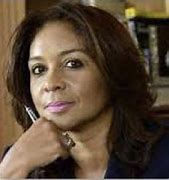
Dr. Avon Hart-Johnson
“Today, I focus on four key areas and recommendations. First, Black women are largely incarcerated for crimes associated with survival and coping, in essence, criminalized mental health conditions, domestic violence, unaddressed substance use, has likely led to their incarceration. Recommendation number one: abolish prisons. When sanctions of a last resort are warranted, these women should be offered holistic care as a community-based alternative to restore health and well-being. Second, the Universal Declaration of Human Rights Article 5 states in part: ‘No one should be subjected to cruel, inhumane or degrading treatment or punishment’, yet alarming reports of physical and psychological violations occur in women’s prisons every day. In 2015 alone, there were 25,000 incidents and allegations of sexual abuse, extortion, rape, groping, or other sexual related abuses in prison. Recommendation number two: we demand reparative justice, holding carceral systems responsible for past harms, current harms and preventing future harms. All prisons and halfway houses should be converted to healing centers, with emphasis placed on mental and physical health care, funded by the Federal Bureau of Prisons. Third, the United Nations recognizes the right to the highest attainable standards of physical and mental health, in particular Article 25. The denial of adequate mental health intervention and gender specific health care needs, and adequate menstrual products, in prison, result in women making dehumanizing tradeoffs between basic needs and hygiene. The use of medically unsafe trauma-inducing restraints and shackles on pregnant women should cease today. Recommendation number three: we demand that incarcerated women have access to adequate health care as a matter of human rights as a public imperative. Finally, and fourth, maternal incarceration has the greatest impact on children and intergenerational incarceration. According to the Universal Declaration on Human Rights Article 12, incarcerated persons have the right to family life, a protective factor that can mitigate the cycle of incarceration. The fourth recommendation: incarcerated women should not be arbitrarily separated from their families, and their right to family life must be respected and restored, with efforts made to ensure that contact is maintained between mothers and children, and vital family bonds preserved.
“Thank you for the opportunity to testify.”
“The total harm in under 50 years of mass incarceration comes to 7.16 trillion dollars. That’s more than half the value of the entire Black-White wealth gap. No other form of domestic state violence carried out in the United States since the beginning of the 20th century compares to the scope and scale of these effects. If we are ever going to move beyond mass captivity, beyond the mass exploitation of Black women’s bodies and labor on this continent, we need universal understanding in the US and around the world of the vast harms of mass incarceration.”
— Dr. Tasseli McKay
Attorney Maya Hylton-Garza, Esq. has worked with prisoners who have relatives who have been incarcerated, worked in cities like Baltimore, Oakland and Los Angeles. She spoke “about the primacy of the American criminal justice system from the perspective of someone who works inside it.
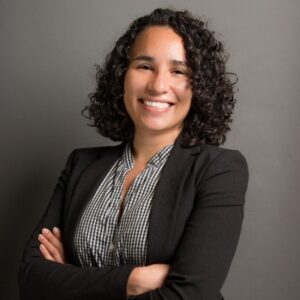
Attorney Maya Hylton-Garza, Esq.
“To put it plainly, it’s a mess. But calling it a mess is [insufficient]; what it truly is, is a horror show. The United States incarcerates more people than any other country, being responsible for about a quarter of the world’s imprisoned people. Despite accounting for only about 13% of the US population, Black people comprise 38% of that incarcerated population. Along with incarcerating more people than any other country, the US also incarcerates more women than any other country. Racial bias permeates every facet of the system, reflecting the … lineage from the present-day system to the earliest days of slavery. At the onset, we had Slave Codes, a separate and more severe set of crimes and punishment for slaves. Following emancipation, the existence of this dual system did not disappear. While we may no longer explicitly have a separate set of crimes and punishments for Black people, evidence of racially disparate treatment can be seen throughout the system. While the United States has not yet consistently and accurately [shared] data on arrest, prosecution and incarceration trends, what we do know is that there is clear evidence pf racially disparate arrests, racially disparate sentencing, [with] more and longer sentences given to Black people and racially disparate administration of parole and probation. Aging People in Prison Human Rights Campaign is an abolitionist organization that [argues that] the process of emancipation for all Black people in the United States cannot conclude until the criminal justice system is abolished. The Supreme Court … very explicitly acknowledged the possibility of racial prejudice influencing a jury’s decision in any criminal case. When faced with actual statistical evidence of racial bias influencing a death penalty case, they found it as ‘not unacceptable’, allowing the death penalty to stand. With a Supreme Court so comfortable with allowing an ‘acceptable amount’ of racial discrimination to infect every Black person’s interaction with the criminal justice system, there is no reform that could occur that would be able to repair the corrupt White Supremacist heart of the current system. Aging People in Prison seeks the dismantling of the systems that support and reify such oppression, including the police, the judiciary and the carceral state. Nothing less will set us free.”
Dr. Tasseli McKay, a social scientist and record of policy scholar at Duke University, shared “new figures from my research on the economic impact of mass incarceration on Black women. …
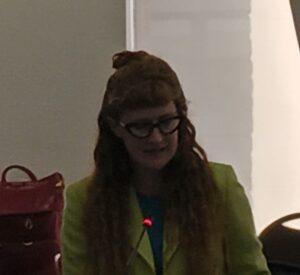
Dr. Tasseli McKay
“For all of this century in the US, the huge Black-White wealth gap that is the legacy of slavery was slowly narrowing. Those gains, small and slow, were very hard won. But in the 1970s, following great Civil Rights progress in the US, our criminal legal system began to be mobilized against Black Americans in an intensely violent and far-reaching way. As it did, the wealth gap also began to widen again, in a way it had not since the ferocious anti-Black mass political violence of the late 1800s. During the mass incarceration years, the wealth of the typical Black household has dropped 75%, while that of the typical White household has risen 14%. Mass incarceration has brought tremendous harm to Black women, families and communities, and social scientific evidence makes it possible to rigorously calculate its economic impact. I’ve written two academic books about this work, carefully reviewed by top economists and criminal legal system scholars, and so I have great confidence in what I’m about to tell you about these costs. The criminalization of Black children and youth, and their pipelining out of educational and supportive institutions has sapped 4.31 trillion dollars. The perpetual punishment of formerly incarcerated Black adults, particularly their long-term exclusion from the formal workforce, has sapped 1.07 trillion dollars. The burdens and harms shunted onto partners and mothers of incarcerated Black adults total 434 billion dollars. The lifelong repercussions for Black children of the incarcerated, particularly in lost educational opportunity, total 452 billion dollars. And the community and population-scale damages, particularly impacts on Black infant mortality and adult life expectancy, total 890 billion dollars. The total harm in under 50 years of mass incarceration comes to 7.16 trillion dollars. That’s more than half the value of the entire Black-White wealth gap. No other form of domestic state violence carried out in the United States since the beginning of the 20th century compares to the scope and scale of these effects. If we are ever going to move beyond mass captivity, beyond the mass exploitation of Black women’s bodies and labor on this continent, we need universal understanding in the US and around the world of the vast harms of mass incarceration. We need reconstruction of the abusive public institutions that did these harms. And we need at least 7.16 trillion dollars in reparations to Black women and communities for mass incarceration. Thank you so much.”
Attorney Efia Nwangaza, Esq. made additional comments:
“I would simply add to the information and comments that have already been made in that when we talk about reparative justice, when we talk about reparations, we’re talking about full and complete reparations, and the full and complete reparations go far beyond the money that necessarily includes the rebuilding of the individual and of a people or peoples, like the abused adopted child. We long to know who and what we are, where we were kidnapped from, what were then our names, what would have been our language, what would have been our spiritual development system, what would have been our social and familial structure. There is no price that can be put on that; at the same time, every effort must be made to do so.”
Dr. Tasseli McKay added some historical context to the discussion of the harms caused to Black women and Black families, highlighting the intentional and official US policy nature of these harms, dating back to the Richard M. Nixon administration and even before that.
“I’d like to read a quote from John Ehrlichman, who was the domestic policy advisor to Richard Nixon, widely understood by people in my field as the forefather of mass incarceration. And I’m quoting him now:
‘The Nixon Campaign in 1968 and the Nixon White House after that had two enemies: the anti-war left and Black people. You understand what I’m saying? We knew we couldn’t make it illegal to be either against the war or Black, but by getting the people to associate the hippies with marijuana and Blacks with heroin, and then criminalizing both heavily, we could disrupt those communities. We could arrest their leaders, raid their homes, break up their meetings, and vilify them night after night on the evening news. Did we know we were lying about the drugs? Of course we did.’ [from an interview Ehrlichman gave to Dan Baum in 1994, published in the April 2016 issue of Harper’s Magazine — Editor.]
“I’d like to add that I think it’s important that we understand this as the domestic state violence that it is and has been, and that the impacts of that state violence on Black women in particular have been concealed of necessity, because the work that Black women have taken on in the face of this state violence has been to absorb, to cushion and to defend their families and communities against it, perpetually, and without their permission concealing the true magnitude of its effects. The costs of this system are so much greater than we have ever acknowledged and those costs have been borne by the most vulnerable among us, and because those costs could not come out of bank accounts, they have come out of bodies. Chris Wildeman’s research on the impacts of mass incarceration on population health in the United States shows that yes, mass incarceration has done definitive damage to our health as an entire population, and yes, those effects on life expectancy and infant mortality have been concentrated predominantly in Black communities. And yes, those effects on life, the years taken off of American lives by mass incarceration, have come off of Black women’s lives. When we look at the effects of rising Black male incarceration rates, beginning around 1978, on population health in the US, we see that the years of life lost came primarily from Black women. There’s so much that has happened, so much that has been concealed and so much strength that has been standing in resistance to this domestic state violence for many decades. Thank you so much for the time to speak to you.”
“I don’t understand why the American establishment doesn’t recognize this, and it doesn’t augur well for the reputation of the state, for this sort of thing to go on. And then I hear politicians on TV, in Congress and the Senate, Senators and Congressmen, talking about how America is not a racist country. That is the biggest, what I call ‘real politics’, because everybody looking around can recognize it, and yet they’re denying it, so how much trust can one have in the system?”
– IACHR President Margarette May Macaulay
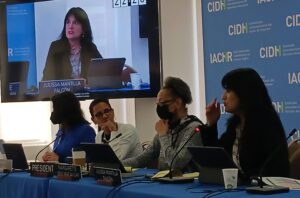
The IACHR Commission members ask questions to the presenters.
The members of the Commission asked a number of follow-up questions. President Margarette May Macaulay added a comment and a question: “Thank you for the personal stories that show what these policies do to life and families. Thank you also for the empirical evidence that combines the information into research in action about these punitive policies that have been repeated from 1940 until today. You referred to identity reparations, and we would like to hear more about that. What are the triggers that cause the increasing harshness of the penalties?”
Attorney Efia Nwangaza, Esq. offered some additional perspective on the Black reparations struggle.
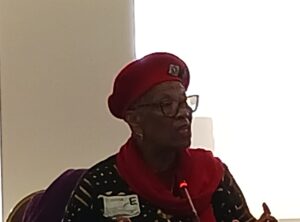
Attorney Efia Nwangaza, Esq. makes a point.
“To talk about reparations, the (IACHR) President rounds it out in a simple word: personhood, that full and complete reparations required restoration of personhood. We have since the Civil War in the United States, made demands for reparations, and the visibility and the intensity of that struggle has risen and fallen depending upon political circumstances. At the moment it enjoys great visibility and global recognition, and we credit that to the 2001 Durban Declaration and Programme of Action, which was the opportunity to globalize the issue and to bring together the Afrikan community globally in formulating the consensus that the DDPA is [important], and even more importantly and recently is the struggle to protect and defend the DDPA against the onslaught of the former, well, the colonizers, because some of them are still in place, and enslavers attempting to distract us from the consensus that was reached with the DDPA, and most importantly its civilization and expression of self-determination, setting forth the crimes against humanity and the basis for global reparations, slavery, colonization, apartheid and genocide, and that we must not allow the creation and the mandate that was given to the Permanent Forum on People of Afrikan Descent or the Agenda 2030 SDG’s, Sustainable Development Goals, to become the shiny objects that take us away from the DDPA and the significance of that expression of self-determination, which of course also includes the Five Elements that define those guidelines as to what would constitute full and complete reparations. We look forward to submitting further information on that point, and consistent with the questions that you have asked here, suffice it to say that the greatest violations continue to occur in the South, what we call ‘the Black belt’, which is where the Afrodescendant population was enslaved in the largest numbers and continues to this day to live despite our apparent mobility and our escape from bondage. Finally I would add that the US Constitution provides for the continued enslavement of people generally and Afrikan people particularly. It was a concession that was made to the South wherein the 13th Amendment is thought to abolish slavery, however it does not. It only shifts the enslavement of persons from private hands to public hands, the hands of the government. It provides that a person cannot be held in involuntary servitude except in the case of a crime. And of course it is the enslavers who have defined what human behavior is criminal. And that invariably falls heaviest on people of Afrikan descent and Afrikan women in particular. Thank you.”
“We have since the Civil War in the United States, made demands for reparations, and the visibility and the intensity of that struggle has risen and fallen depending upon political circumstances. At the moment it enjoys great visibility and global recognition, and we credit that to the 2001 Durban Declaration and Programme of Action, which was the opportunity to globalize the issue and to bring together the Afrikan community globally … and even more importantly and recently is the struggle to protect and defend the DDPA against the onslaught of the former, well, the colonizers, because some of them are still in place, and enslavers attempting to distract us from the consensus that was reached with the DDPA …”
— Attorney Efia Nwangaza, Esq.
Attorney Maya Hylton-Garza, Esq. spoke about state-run versus private institutions, racialized arrest practices and released prisoners being saddled with heavy debts to the state that had imprisoned them.
“I want to speak to two things, the question of abuse in state-run versus private facilities and the question of racialized arrest practices. … The United States Congress mandated under the Prison Rape Elimination Act a comprehensive study of sexual assault and sexual abuse in United States correctional facilities. That study … included a representative sample, i think, of maybe 400 United States correctional facilities. That study used state of the art methods and it did document the very substantial prevalence of sexual assault around the country and it highlights not only in adult prison facilities but in detention facilities that house children, very widespread prevalence of sexual assault and abuse. And further, I’ll note that to my knowledge there is no established difference in rates of abuse in private-run versus state-run facilities, and that isn’t intended to be offered in defense of private facilities so much as I think it speaks to the extent to which our public institutions have been harnessed to abusive ends in a time of mass incarceration.
“With regard to the question about racialized arrest practices, in the contemporary United States, 49% of Black men can expect to be arrested by the time they reach age 23. We’ve seen in the work of … Vesla Weaver and colleagues, [which] demonstrates that in fact, over the decades of mass incarceration, we have seen what she calls a great uncoupling of arrest from criminalized behavior such that arrest is now so racially targeted that it is less and less correlated with engagement in any criminalized activity and more strongly correlated with perceived race, and that racial disproportionality of course, as you all know well, continues at every level of the system and its impacts are so devastating, even at the point of arrest and policing as your remarks highlighted, many jurisdictions have implemented what they euphemistically call ‘proactive policing strategies’: stop-and-frisk, hotspot policing, various forms of aggressive police engagement and implementation of these policies we know from several rigorous social scientific studies is strongly correlated with a drop in well-being across the Black population of those cities. So, for example, we see Black students’ educational achievement drop in New York City with the implementation of stop-and-frisk, and there are examples like that from social science research across the country.
“I also want to speak to this question, which is very well taken, of individuals released from incarceration with tremendous debt to the state. To my knowledge, that practice is much more the rule than it is the exception, and those debts have to do with everything from system fees, parole monitoring fees, court fees, victim restitution, and an enormous contributor to that debt is child support enforcement. Many families have enormous debt to the child support enforcement system after the incarceration of a loved one, and often a five-figure debt, in particular because, in most states, that continues to rack up those arrears during incarceration, even though earning enough funds to pay those commitments is a true impossibility during that time. And to the also quite well taken question of what happens when individuals are released with debts that are far beyond their capacity to pay, what happens to those debts, there is fairly strong indication that those debts are paid by the women family members of incarcerated and released individuals. They are not forgiven. They are shunted onto those who can least afford them.”
Dr. Avon Hart-Johnson made further comments on behalf of mothers of incarcerated persons and the impact on families.
“I’d like to address the question about what happens when the mother is incarcerated. The first thing I want to say is that, when you incarcerate the mother, it has the greatest impact on the children. Let me give you an example. In Washington DC, we don’t have a prison. So therefore, when mothers are separated from their children, they are sent across the United States to serve their sentences. That could be California, Texas, West Virginia, for example. We know that in Washington DC, the zip codes that have the highest incarceration rates also have 16% of the people living at or below the poverty level. So how do you stay connected? Let’s talk about what happens in the family system. Well, first of all, it’s recognized as a crisis. Children are often not told where their parents are because of the stigma and shame associated with it, or perhaps the adults who are raising the children at home don’t want to emotionally burden the children. We know that about 11% of the fathers are taking care of children. We know that 11% of the children are going to go into foster care. And the vast majority are going to stay with the grandmother or grandparents who may be on a fixed income. So when we start to think about what happens with the children and why is this thing about intergenerational incarceration showing up, well, the short story is, parental incarceration is an adverse childhood experience. Probably 60% of us in this room have gone through an adverse childhood experience. It could be a frequent change of caregivers, it could be abuse, neglect, it could be violence or conflict in the home, or parental incarceration. The thing is, when children are exposed to contiguous stressors, it actually changes their genetics. So, there’s this science called epigenetics, and so when children are living in these situations, incarceration is probably just one issue, there are many complex issues going on at the same time. When the body is exposed to contiguous stressors, over and over again, it stays in a state of hyper-vigilance, and the cortisol levels are bring produced, and those kids are always in fight-or-flight, even if it doesn’t look like it, they’re in fight-ir-flight, and so therefore, the genes in the body will adjust, and it will start to put all of this energy in the fight-or-flight, rather than fighting off infections.”
Attorney Maya Hylton-Garza, Esq. spoke about efforts at reforming the carceral system:
“I just wanted to speak briefly on some reforms that are occurring. In the state of California, the Racial Justice Act was passed, which specifically tries to address the effects of racially disparate sentencing and arrests, and allows for somebody who has been convicted to bring forward evidence of racially discriminatory behavior and then allow for some type of reduction in sentencing. The law is extraordinary in the fact that it is retroactive, and it covers all families and anybody who has picked up a juvenile case, so as far as we’re concerned that’s basically everybody in the state of California who has been arrested and experienced … confinement. The law has been passed. We don’t know yet how the judges are going to handle that responsibility. It’s the Racial Justice Act, 2021. Right after George Floyd, people were very inspired to suddenly realize discrimination existed. And so, we don’t know yet. It leaves a lot to the judges in terms of how they’re going to handle each of those cases. But it does allow [for evidence of] racially discriminatory behavior to be used as evidence to prove the case, and so that is one example of reform. There are two other states that have passed Racial Justice Acts. Neither one of those are effective in any way. One is so broad that no one can use it and the other one is so narrow that no one can use it. The first one was so broad that it was repealed, and the second one is so narrow that it’s useless. We don’t know yet how California is going to handle this, how California judges are going to handle this power. I’m going to stay optimistic, but what we’ve seen in the United States is that there is a fear of too much justice, that because everyone has experienced racial discrimination, Black and Brown and Native American people have experienced racial discrimination that has impacted the way in which they engage with the carceral state, that reform would require everyone to be helped, and the United States is simply unwilling to do that.”
Closing Remarks from the Chair
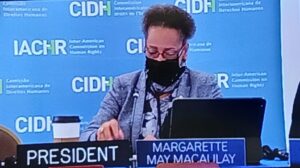
IACHR President Margarette May Macaulay
IACHR President Margarette May Macaulay offered some closing comments. She noted that quite a few people have been released because DNA evidence showed their convictions were false, evidence was flawed and the convictions and sentences were unlawful. She noted that in other countries, “such persons will be compensated by the state for their mistake”. In the news, we see that people who are released in the US have received “no compensation, despite the claims about America’s largesse. Where is that when they are at fault?” There are similar issues with social welfare, in which recipients who were determined to have received Social Security and health benefits by mistake were ordered to repay years later (usually with onerous amounts of interest) regardless of their ability to pay. This had been reported on the previous day on the CBS News program 60 Minutes.
President Macaulay asked what the presenters would want the Commission to do to assist them in this matter, and expressed the desire to collaborate with them. IACHR wants to hear about the issues and specific complaints people have that are related to this case. The Web site and phone number are available for submitting information and complaints, and there is training available in some cases for Non Governmental Organizations.
Ms. Macaulay closed with these comments: “This is long past due, long, long past due. And I don’t understand why the American establishment doesn’t recognize this, and it doesn’t augur well for the reputation of the state, for this sort of thing to go on. And then I hear politicians on TV, in Congress and the Senate, Senators and Congressmen, talking about how America is not a racist country. That is the biggest, what i call ‘real politics’, because everybody looking around can recognize it, and yet they’re denying it, so how much trust can one have in the system? So please, let’s collaborate. And thank you, thank you, thank you for coming to us.”
About the IACHR
IACHR’s mission statements explain that
The IACHR is a principal and autonomous organ of the Organization of American States (“OAS”) whose mission is to promote and protect human rights in the American hemisphere. It is composed of seven independent members who serve in a personal capacity. Created by the OAS in 1959, the Commission has its headquarters in Washington, D.C. Together with the Inter-American Court of Human Rights (“the Court” or “the I/A Court H.R.), installed in 1979, the Commission is one of the institutions within the inter-American system for the protection of human rights (“IAHRS”).
The formal beginning of the IAHRS was approval of the American Declaration of the Rights and Duties of Man at the Ninth International Conference of American States held in Bogota in 1948. There the OAS Charter (hereinafter “the Charter”) was adopted, which declares that one of the principles upon which the Organization is founded is the “fundamental rights of the individual.”
Full respect for human rights appears in several sections of the Charter, underscoring the importance that the Member States attach to it. In the words of the Charter, “the true significance of American solidarity and good neighborliness can only mean the consolidation on this continent, within the framework of democratic institutions, of a system of individual liberty and social justice based on respect for the essential rights of man.” The Charter establishes the Inter-American Commission on Human Rights (IACHR) as one of the principal organs of the OAS whose function is to promote the observance and protection of human rights and to serve as a consultative organ of the Organization in these matters.
The work of the IACHR rests on three main pillars:
-
-
- the individual petition system;
- monitoring of the human rights situation in the Member States, and
- the attention devoted to priority thematic areas.
Operating within this framework, the Commission considers that inasmuch as the rights of all persons subject to the jurisdiction of the Member States are to be protected, special attention must be devoted to those populations, communities and groups that have historically been the targets of discrimination. However, the Commission’s work is also informed by other principles, among them the following: the pro homine principle, whereby a law must be interpreted in the manner most advantageous to the human being; the necessity of access to justice, and the inclusion of the gender perspective in all Commission activities.
According to the American Convention on Human Rights, the Commission shall be composed of seven members, who shall be persons of high moral character and recognized competence in the field of human rights, elected in a personal capacity by the OAS General Assembly from a list of candidates proposed by the governments of the Member States. Each of those governments may propose up to three candidates, who may be nationals of the State proposing them or of any other OAS Member State. When a slate of three is proposed, at least one of the candidates shall be a national of a State other than the one proposing the slate. The members of the Commission are elected for a four-year term and may be reelected only once.
For more information on IACHR and OAS, go to the Web site https://www.oas.org/en/IACHR/jsForm/?File=/en/iachr/mandate/composition.asp.
To View the Full Hearing Video
The full hearing in video form, ‘Loss of Resources and Impact of Intergenerational Incarceration on Black Women’, can be viewed at https://www.oas.org/en/iachr/sessions/?S=188 (scroll down to Monday’s hearings, APP-HRC is first hearing)
About Aging People in Prison Human Rights Campaign (APP-HRC)
APP-HRC is an organization dedicated to securing the freedom of those who have been held in penitentiaries and prisons for upwards of 20 to 50 years. Many of these aging people in prison are what we often refer to as Political Prisoners, members of organizations such as the Black Panther Party (BPP), American Indian Movement (AIM), MOVE and other political-dissident groups who were targeted under the United States Federal Bureau of Investigation’s Counter-Intelligence Program (COINTELPRO). Others were convicted in tainted trials on questionable evidence in spite of their lack of political activism, and still others were handed draconian sentences for relatively minor offenses and have been imprisoned for decades. Practically all of the prisoners and former prisoners represented by APP-HRC have grown old under incarceration, and have faced struggles not only in securing their release through parole or exoneration, but also in adjusting to “life on the outside” after being freed.
We ask you to support APP-HRC by making a donation to https://www.apphrc.com/Donate.php; Aging People in Prison Human Rights Campaign (https://apphrc.com) so they can continue to do their human rights reparative justice work of breaking the systemic pipeline to mass/intergenerational incarceration.

Like this:
Like Loading...

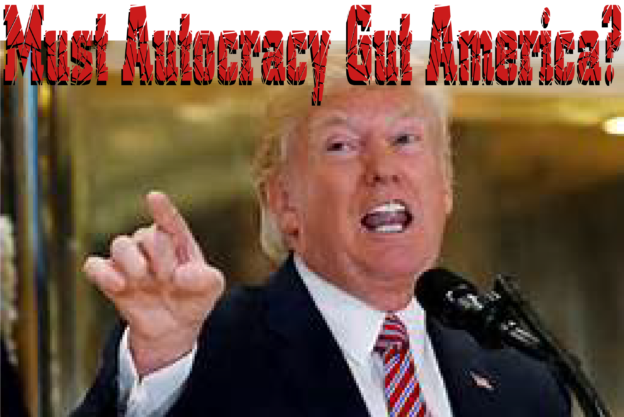
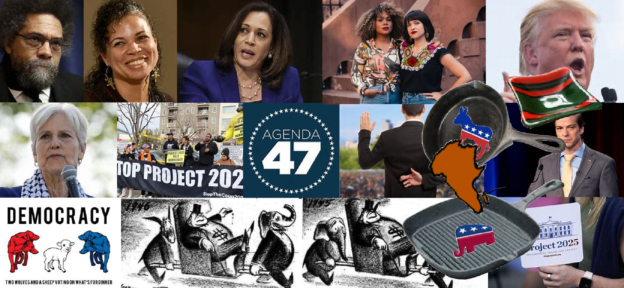
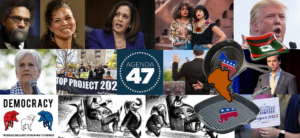 The country holds its breath as Election Day approaches. The major candidates hold massive rallies in a last-ditch effort to mobilize voters in their favor, even as they confidently predict victory for themselves and their followers nervously watch the early vote totals and crunch the latest poll numbers. People in the electorate struggle to sort out fact from fiction in the face of a constant onslaught of disinformation (complete with “deep fake” videos and posts on X), they speculate among each other about the latest developments, they argue in favor of their preferred candidates, or they debate the merits of participating in the electoral process at all. For someone trying to understand the political intrigues and make an informed voting decision, things can get quite confusing.
The country holds its breath as Election Day approaches. The major candidates hold massive rallies in a last-ditch effort to mobilize voters in their favor, even as they confidently predict victory for themselves and their followers nervously watch the early vote totals and crunch the latest poll numbers. People in the electorate struggle to sort out fact from fiction in the face of a constant onslaught of disinformation (complete with “deep fake” videos and posts on X), they speculate among each other about the latest developments, they argue in favor of their preferred candidates, or they debate the merits of participating in the electoral process at all. For someone trying to understand the political intrigues and make an informed voting decision, things can get quite confusing.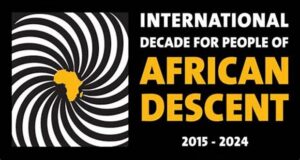 April 16-19, 2024 is the Third Session of the Permanent Forum on People of African Descent (PFPAD), which was created by the United Nations just under two years ago. PFPAD has held two Sessions already, one in Geneva, Switzerland in December 2022 and another in New York City in June 2023. This Third Session will be held in Geneva, Switzerland from April 16-19, 2024.
April 16-19, 2024 is the Third Session of the Permanent Forum on People of African Descent (PFPAD), which was created by the United Nations just under two years ago. PFPAD has held two Sessions already, one in Geneva, Switzerland in December 2022 and another in New York City in June 2023. This Third Session will be held in Geneva, Switzerland from April 16-19, 2024.







 The Black Freedom Struggle often finds itself being pulled in multiple directions all at once. We must navigate the political intrigues of two dominant political parties that take turns trying to convince us they are our only true friends (Democrats in the areas of voting rights, police accountability and anti-discrimination statutes, Republicans in the areas of gun rights, Straight Black Pride and pull-up-by-your-bootstraps economic independence, though both sides often lie about these things) and enacting policies that make us believe they actually wish for our marginalization or even outright destruction (support for corporate interests that abuse our communities, overthrow and murder of Afrikan, Central American and South American leaders that do not obey the orders of Washington). We must try to make sense of the many and often tangled organizations that, despite their common concern for a free, prosperous, self-determining and safe Black Community, seem to often be at odds with each other as to how to accomplish that allegedly common goal. We are concerned about our livelihoods and the access to employment, although we often see that the industrialized society that provides us sustenance is also responsible for the slow (and not-so-slow) destruction of the very planet on which we depend for our lives.
The Black Freedom Struggle often finds itself being pulled in multiple directions all at once. We must navigate the political intrigues of two dominant political parties that take turns trying to convince us they are our only true friends (Democrats in the areas of voting rights, police accountability and anti-discrimination statutes, Republicans in the areas of gun rights, Straight Black Pride and pull-up-by-your-bootstraps economic independence, though both sides often lie about these things) and enacting policies that make us believe they actually wish for our marginalization or even outright destruction (support for corporate interests that abuse our communities, overthrow and murder of Afrikan, Central American and South American leaders that do not obey the orders of Washington). We must try to make sense of the many and often tangled organizations that, despite their common concern for a free, prosperous, self-determining and safe Black Community, seem to often be at odds with each other as to how to accomplish that allegedly common goal. We are concerned about our livelihoods and the access to employment, although we often see that the industrialized society that provides us sustenance is also responsible for the slow (and not-so-slow) destruction of the very planet on which we depend for our lives. 
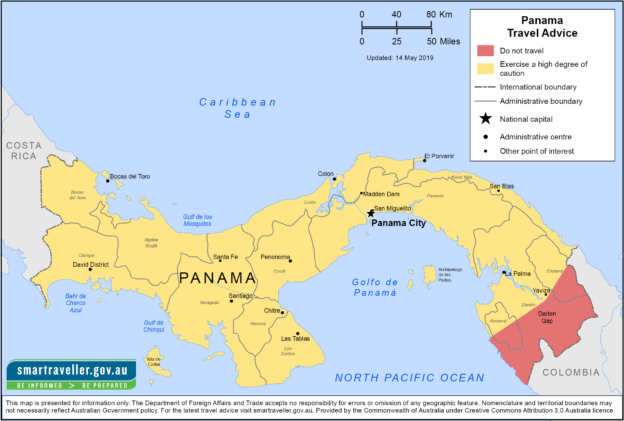
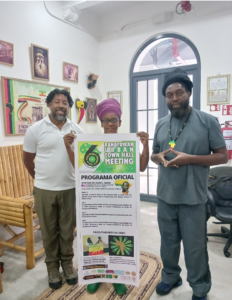 My plane touched down at Tocumen International Airport in Panama on the afternoon of Sunday, May 21, 2023. After I went through the passport check, I went straight to the curbside where I looked for the person who was assigned to meet me at the airport and take me to La Manzana, the conference center and hotel where I was to assist local activists in running Panama’s first Pan-Afrikan Urban Town Hall Meeting. I had decided to travel light so that I could avoid the baggage check line and leave the airport sooner, as well as avoid the possibility of my bags being lost in transit.
My plane touched down at Tocumen International Airport in Panama on the afternoon of Sunday, May 21, 2023. After I went through the passport check, I went straight to the curbside where I looked for the person who was assigned to meet me at the airport and take me to La Manzana, the conference center and hotel where I was to assist local activists in running Panama’s first Pan-Afrikan Urban Town Hall Meeting. I had decided to travel light so that I could avoid the baggage check line and leave the airport sooner, as well as avoid the possibility of my bags being lost in transit.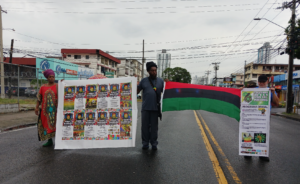 Red, Black and Green flag and, holding all of them together in a chain, we marched three-abreast down the main street and joined the parade. There was music, there were canopies, there were different social organizations and businesses on either side of the road, there were dancers in the street ahead of us, and of course there were the people, all reveling in the celebration of Black culture and dancing to Central American salsa and reggae. Ras Bukie began to interact with the crowds on the sidewalks, occasionally shaking the Red, Black and Green flag, screaming at the top of his voice, “Marcus Garvey! No more brainwash!!” until be became hoarse. We marched with the parade into the evening past sunset.
Red, Black and Green flag and, holding all of them together in a chain, we marched three-abreast down the main street and joined the parade. There was music, there were canopies, there were different social organizations and businesses on either side of the road, there were dancers in the street ahead of us, and of course there were the people, all reveling in the celebration of Black culture and dancing to Central American salsa and reggae. Ras Bukie began to interact with the crowds on the sidewalks, occasionally shaking the Red, Black and Green flag, screaming at the top of his voice, “Marcus Garvey! No more brainwash!!” until be became hoarse. We marched with the parade into the evening past sunset.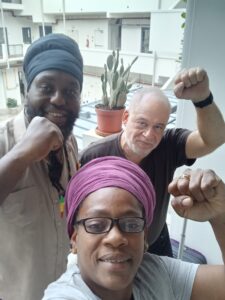
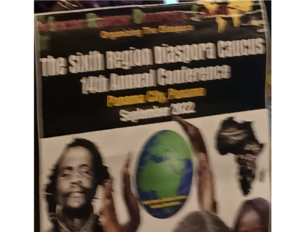 The 2022 SRDC Summit was held from Thursday, September 22 through Sunday, September 25, 2022 in Panama City, Panama. Since SRDC does not yet have an organization in Panama, this amounted to “virgin territory” for our organizing efforts. A number of the hoped-for attendees were not able to secure travel visas to attend the Summit in time, but some of them were afforded the opportunity to connect to the Summit virtually via Zoom. Activists from the Virgin Islands, Costa Rica, The Netherlands, Liberia, the United States and, of course, the host country of Panama were in attendance, with others from the United States, Tanzania, Ghana, Guadeloupe and other locations connecting virtually.
The 2022 SRDC Summit was held from Thursday, September 22 through Sunday, September 25, 2022 in Panama City, Panama. Since SRDC does not yet have an organization in Panama, this amounted to “virgin territory” for our organizing efforts. A number of the hoped-for attendees were not able to secure travel visas to attend the Summit in time, but some of them were afforded the opportunity to connect to the Summit virtually via Zoom. Activists from the Virgin Islands, Costa Rica, The Netherlands, Liberia, the United States and, of course, the host country of Panama were in attendance, with others from the United States, Tanzania, Ghana, Guadeloupe and other locations connecting virtually.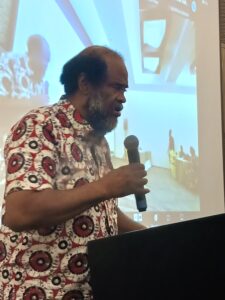
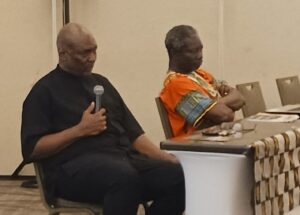
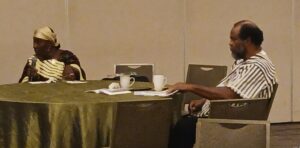
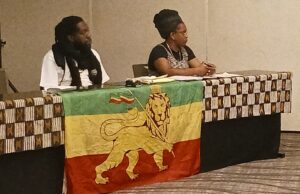
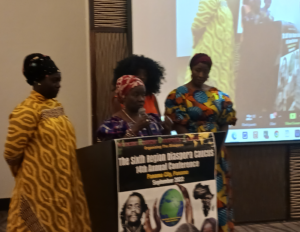
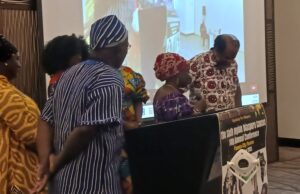
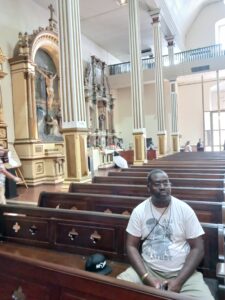
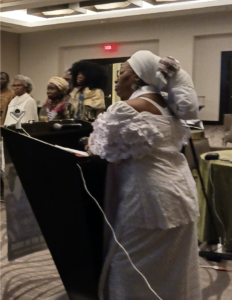
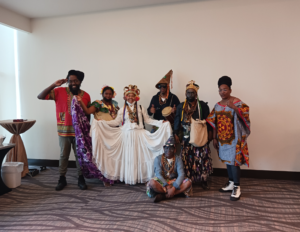

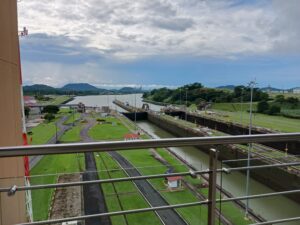
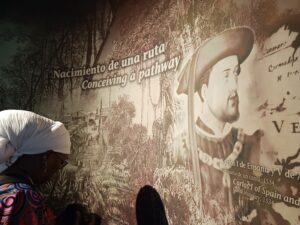
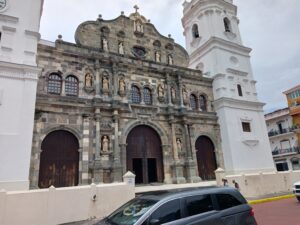
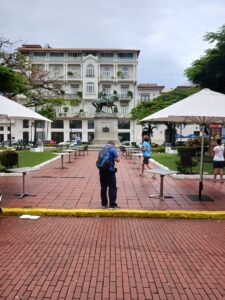
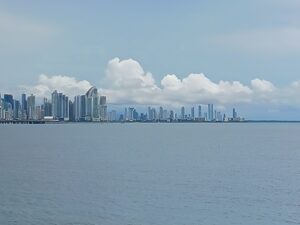
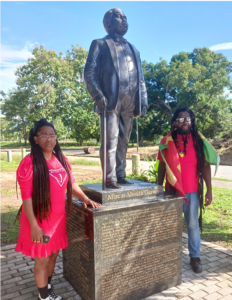
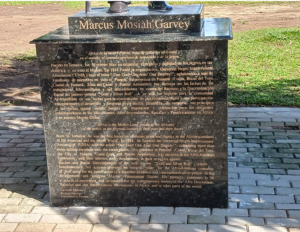
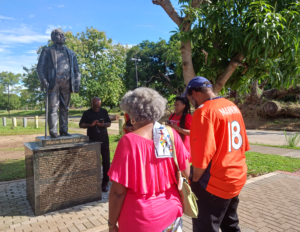
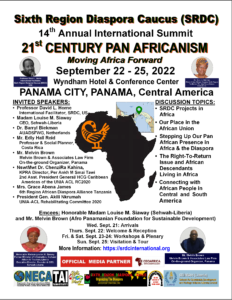 The 14th Annual International Summit of the Sixth Region Diaspora Caucus (SRDC) will be held from September 22 – 25 in Panama City, Panama.
The 14th Annual International Summit of the Sixth Region Diaspora Caucus (SRDC) will be held from September 22 – 25 in Panama City, Panama.